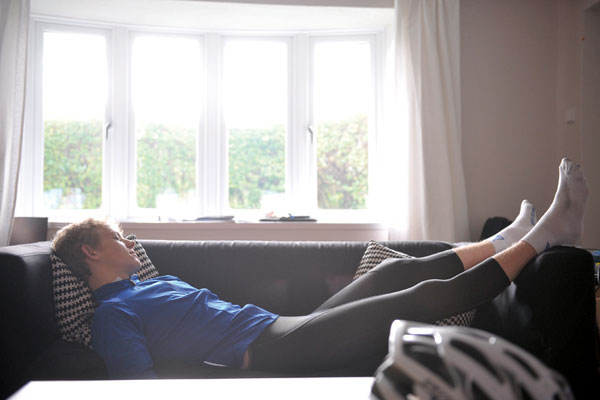Physical performance affected by lack of sleep?
Does sleep loss affect physical performance? The early research suggested that while it was detrimental to cognitive function, sleep loss didn't really have a significant effect on physical performance

The latest race content, interviews, features, reviews and expert buying guides, direct to your inbox!
You are now subscribed
Your newsletter sign-up was successful
However, more recent research has indicated that sleep loss is detrimental to endurance performance - for example, by increasing the perceived exertion to maintain a given workload. Now a new French study has looked at the combined effects of sleep deprivation on both cycling performance and cognitive function.
The science
In the study, 12 fit males underwent two testing sessions. In one of these they had a normal night's sleep and in the other, they were deprived of sleep (ie very tired!).
On the first day, the subjects performed baseline cognitive and neuromuscular testing (testing of the function and activity of the muscles and the nerves that control them). After one night's sleep deprivation or normal sleep, the subjects repeated the day one testing procedure and then performed a 40-minute sub-maximal cycling task and a much higher intensity cycling test to exhaustion.
Neuromuscular and cognitive functions were evaluated during both the cycling protocol and at task failure. The whole procedure was then repeated with those subjects who had been sleep-deprived having a normal night's sleep and vice-versa.
The researchers then looked at the data to see a) what effects the sleep deprivation had on physical and mental performance during the cycling task and b) whether the neurological results provided any insight into the mechanisms that cause fatigue.
In a nutshell
Unsurprisingly perhaps, the sleep deprivation wasn't great for cycling performance; the rate of perceived exertion during the sub-maximal ride was significantly higher and the time to exhaustion on the more intense cycling session was less - the cyclists managed an average of 20.6 minutes to exhaustion after a normal night's sleep but only 18.9 minutes when they were sleep deprived.
Also, some measures of muscle function showed a drop of between five and seven per cent in performance and response - however, overall there were no significant changes in neuromuscular function.
The latest race content, interviews, features, reviews and expert buying guides, direct to your inbox!
One interesting effect however was that cycling seemed to help some measures of cognitive function when the cyclists were in a sleep-deprived state. For example, on the sleep deprived days, the cyclists' reaction times were eight per cent faster after the cycling task than they were before the cycling. Likewise, they were better at completing cognitive tasks in a sleep-deprived state and after the cycling tests had taken place than before.
So what?
The first conclusion that can be drawn from this study is that it provides further evidence that sleep deprivation is harmful to endurance performance such as cycling (although the similar neurological test results didn't help the researchers identify the precise mechanisms behind the fatigue).
In conclusion, if you have a big day on the bike looming, it's almost certainly worth trying to get the best night's sleep you can beforehand!
Med Sci Sports Exerc. 2013 Jun 10. [Epub ahead of print]
Jack Elton-Walters hails from the Isle of Wight, and would be quick to tell anyone that it's his favourite place to ride. He has covered a varied range of topics for Cycling Weekly, producing articles focusing on tech, professional racing and cycling culture. He moved on to work for Cyclist Magazine in 2017 where he stayed for four years until going freelance. He now returns to Cycling Weekly from time-to-time to cover racing, review cycling gear and write longer features for print and online.